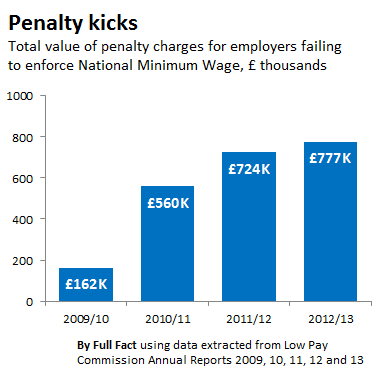Is the government enforcing the minimum wage better?
"We are taking action ... last year more than 700 employers received penalties for failing to comply with minimum wage law and the value of those penalties was almost seven times higher than in the final year of the last Labour Government."
David Cameron, Prime Minister's Questions, 12 February 2013
Ever since its inception in 1999, the National Minimum Wage has been rising constantly, outpacing growth in prices, wages and at times even GDP.
It will come as little surprise then that enforcement of the policy has been an issue for most of this period. Today's Prime Minister's Questions featured the latest concerns that the government isn't doing enough to enforce the wages people are entitled to.
Join 72,953 people who trust us to check the facts
Sign up to get weekly updates on politics, immigration, health and more.
Subscribe to weekly email newsletters from Full Fact for updates on politics, immigration, health and more. Our fact checks are free to read but not to produce, so you will also get occasional emails about fundraising and other ways you can help. You can unsubscribe at any time. For more information about how we use your data see our Privacy Policy.
Employers have to pay at least the Minimum Wage by law, although it doesn't apply in all circumstances. People given accommodation by their employer (deducted from their pay) or on a goverment training programmes may be exempt from the laws, for instance.
Where an employer is found by HM Revenue and Customs (HMRC) to have broken the law, they're issued immediately with a 'Notice of Underpayment' and a penalty. That means they have to repay the lost earnings to employees along with a charge on top for non-compliance.
Last year (2012/13), as the Prime Minister refers to, just over 700 penalties were imposed for failure to pay the Minimum Wage, amounting to £777,000 in total charges issued by HMRC. This doesn't explicity say 700 employers were concerned, but HMRC confirmed to us that the numbers were likely to be approximately similar.
That's about five times the level of charge in the last full financial year (2009/10) of the Labour government: 480 cases involved around £162,000 in that year. Not the seven-fold increase the Prime Minister was referring to, although we're still waiting for confirmation of the source the Prime Minister was using.

Whatever the specific scale of the increase, the figures do suggest a huge rise in penalty payments since 2009. But there's more to this story than the graph suggests.
That's because in 2009 the government's policy changed. During the first decade of the Minimum Wage there had been relatively few penalties imposed: only 90 notices were issued to non-compliant employers in the first three years of the policy.
So via the Employment Act 2008, the then Labour government tightened the rules on enforcement, increasing the payments employers would be liable for and making a fine automatic where a breach was discovered rather than having an initial warning notice ('enforcement notice') prior to any penalty action being taken.
The new system started from 1 April 2009. This in part explains the very low value of penalties in this year compared to later years: HMRC investigations into non-compliance take time, and while a large number of investigations might have commenced in 2009/10, the effects of some of those investigations will only have been felt in more recent years.
So the increase being referred to by the Prime Minister since the election in large part reflects the effects of a law introduced by the previous government.